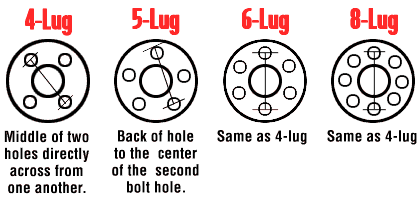Decoding Your Wheels: Mastering Rim Bolt Pattern Measurement

Ever wondered how to ensure your new wheels fit perfectly? The key lies in understanding your rim's bolt pattern. This seemingly simple task can become a source of confusion, leading to improper fitment and potential safety hazards. This guide will equip you with the knowledge to confidently measure your rim bolt pattern, ensuring a smooth and safe ride.
Accurately determining the bolt pattern, also known as the lug pattern or PCD (Pitch Circle Diameter), is crucial for proper wheel and tire installation. It dictates how the wheel attaches to your vehicle's hub, influencing everything from handling to brake performance. Ignoring this critical measurement can result in vibrations, premature wear, and even wheel detachment.
The concept of standardized bolt patterns arose with the mass production of automobiles. Early wheels often had unique mounting systems, making replacements difficult. Standardization simplified the process, allowing for interchangeability between different makes and models. Today, understanding how to decipher this standard is vital for any car enthusiast or DIY mechanic.
One of the main challenges in measuring bolt patterns is the variety of configurations. From 4-lug to 8-lug patterns, each requires a slightly different approach. Moreover, differentiating between similar patterns, such as 5x100 and 5x114.3, demands precision. A small error can lead to purchasing the wrong wheels, resulting in wasted time and money.
Before diving into the measurement process, it's important to define some key terms. The "bolt pattern" refers to the number of lug holes and the diameter of the circle formed by their centers. For example, a 5x114.3 bolt pattern indicates 5 lug holes with a PCD of 114.3mm. Understanding this nomenclature is the first step to successful measurement.
Accurately measuring your rim bolt pattern offers several benefits. First, it guarantees proper wheel fitment, ensuring safety and optimal vehicle performance. Second, it saves you from costly returns and exchanges by preventing the purchase of incompatible wheels. Third, it empowers you to make informed decisions about wheel upgrades and modifications, expanding your customization options.
There are two primary methods for measuring bolt patterns: one for even-numbered lug patterns and another for odd-numbered patterns. For even-numbered patterns, measure the distance directly across the center of two opposing lug holes. For odd-numbered patterns, measure from the center of one lug hole to the outermost edge of the opposing lug hole, then multiply this measurement by 1.701 to get the PCD. Always double-check your measurements for accuracy.
Advantages and Disadvantages of Accurate Bolt Pattern Measurement
| Advantages | Disadvantages |
|---|---|
| Ensures proper wheel fitment | Requires careful measurement |
| Prevents costly returns | Can be confusing for complex patterns |
| Enables informed wheel upgrades |
Best Practices for Measuring Rim Bolt Patterns:
1. Use a precise measuring tool like a caliper or ruler.
2. Clean the mounting surface for accurate measurements.
3. Double-check your measurements.
4. Consult online resources for bolt pattern specifications.
5. If unsure, consult a professional.
Frequently Asked Questions:
1. What is a bolt pattern? (Answered above)
2. Why is it important to know my bolt pattern? (Answered above)
3. What tools do I need to measure my bolt pattern? (Caliper or ruler)
4. What if my measurement is slightly off? (Consult a professional)
5. Where can I find bolt pattern information for my vehicle? (Online databases, owner's manual)
6. Can I change my bolt pattern? (Generally not recommended, requires professional modification)
7. What are the consequences of using the wrong bolt pattern? (Vibrations, damage, potential wheel detachment)
8. Are there any apps that can help me determine my bolt pattern? (Yes, several apps are available for both Android and iOS)
Tips and tricks: Use a digital caliper for greater precision. If you're having trouble measuring an odd-numbered pattern, try using a piece of string and a ruler. Remember to measure twice, cut once (or in this case, buy once).
Understanding how to measure your rim bolt pattern is an essential skill for any car owner. From ensuring safety and performance to enabling informed customization choices, the benefits are significant. While the process might seem daunting at first, following the steps outlined in this guide and utilizing the available resources will empower you to confidently measure your bolt pattern and avoid costly mistakes. By taking the time to learn this fundamental skill, you're investing in the longevity and safety of your vehicle. Don’t hesitate to consult with a professional if you encounter any difficulties. Accurate measurement is the cornerstone of proper wheel fitment and a crucial step towards a safer and smoother driving experience. So, grab your measuring tools, and decode your wheels today!
Conquering the nyc marathon choosing the perfect hotel hq
Ace ap physics 1 your guide to practice success
Joe rogans marital status unraveling the mystery













